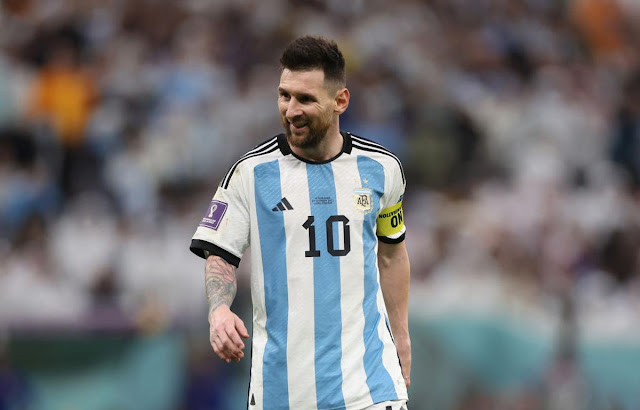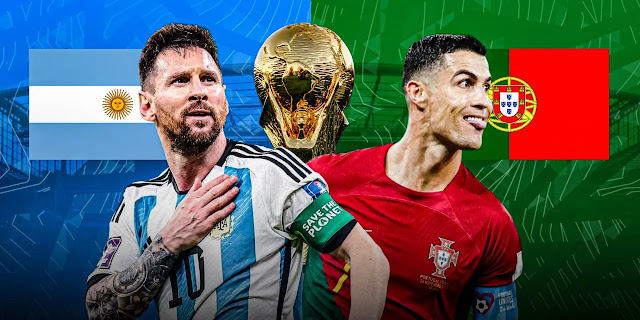Messi New Outcomings Pics Of Qatar FiFA World Cup
The cameras panned around, desperate to catch Messi's reaction. The '10', who has been the player of the tournament and whose performances have inspired Argentina to victory, sunk to his knees and looked to the sky. Incredulous, in shock, and thankful.
He was instantly surrounded by his teammates by whom he is revered, many bawling their eyes out, overwhelmed by the raw emotion of the moment, the best day of their lives. Argentina is the Qatar 2022 World Cup winner and Lionel Messi is, without doubt, the greatest player of all time.Montiel stepped up to take the final penalty, a penalty that would win his country the World Cup for the third time in its history. Composed and assured, the right back had no doubts in his mind, and slotted home the winning penalty- a penalty that will write himself, his team and above all Lionel Messi into the annals of football history.
His behaviour during the awards ceremony and then on the bus parade in Buenos Aires has led many to actively criticize the goalkeeper, and he has responded to that by guarding his treasure.
He has splashed out on a 20,000 pound guard dog which has been used by the US Navy Seals in the past.
The breed of dog is a Belgian Malinois and it will protect his wife and two children as well as the precious medal and trophy that he received.
Martinez put in some seriously impressive performances as Argentina won their third-ever World Cup, having not won the tournament since 1986. Whilst much of the focus was on Lionel Messi, there was still plenty of appreciation for the quality that Martinez showed.
He made a particularly important save in the final against France during extra-time. If he did not make that save, Argentina would have been beaten before the penalties could even take place.
According to the Daily Star, the dog can weigh up to 30kg and has been used by US Navy Seals and the SAS in combat.
Foods With Fitness
Foods With Fitness
Foods With Fitness
Foods With Fitness
Foods With Fitness
Foods With Fitness
Foods With Fitness
Foods With Fitness
Foods With Fitness
Foods With Fitness
Foods With Fitness
Foods With Fitness
Foods With Fitness
Foods With Fitness
Foods With Fitness
Foods With Fitness
Foods With Fitness
Lionel Andrés Messi[note 1] (Spanish pronunciation: [ljoˈnel anˈdɾes ˈmesi] (listen); born 24 June 1987), also known as Leo Messi, is an Argentine professional footballer who plays as a forward for Ligue 1 club Paris Saint-Germain and captains the Argentina national team. Widely regarded as one of the greatest players of all time, Messi has won a record seven Ballon d'Or awards,[note 2] a record six European Golden Shoes, and in 2020 was named to the Ballon d'Or Dream Team. Until leaving the club in 2021, he had spent his entire professional career with Barcelona, where he won a club-record 35 trophies, including 10 La Liga titles, seven Copa del Rey titles and four UEFA Champions Leagues. With his country, he won the 2021 Copa América and the 2022 FIFA World Cup. A prolific goalscorer and creative playmaker, Messi holds the records for most goals in La Liga (474), most hat-tricks in La Liga (36) and the UEFA Champions League (8), and most assists in La Liga (192) and the Copa América (17). He has also the most international goals by a South American male (98). Messi has scored over 790 senior career goals for club and country, and has the most goals by a player for a single club (672).
Born and raised in central Argentina, Messi relocated to Spain at the age of 13 to join Barcelona, for whom he made his competitive debut aged 17 in October 2004. He established himself as an integral player for the club within the next three years, and in his first uninterrupted season in 2008–09 he helped Barcelona achieve the first treble in Spanish football; that year, aged 22, Messi won his first Ballon d'Or. Three successful seasons followed, with Messi winning four consecutive Ballons d'Or, making him the first player to win the award four times. During the 2011–12 season, he set the La Liga and European records for most goals scored in a single season, while establishing himself as Barcelona's all-time top scorer. The following two seasons, Messi finished second for the Ballon d'Or behind Cristiano Ronaldo (his perceived career rival), before regaining his best form during the 2014–15 campaign, becoming the all-time top scorer in La Liga and leading Barcelona to a historic second treble, after which he was awarded a fifth Ballon d'Or in 2015. Messi assumed captaincy of Barcelona in 2018, and in 2019 he won a record sixth Ballon d'Or. Out of contract, he signed for Paris Saint-Germain in August 2021.

An Argentine international, Messi holds the national record for appearances and is also the country's all-time leading goalscorer. At youth level, he won the 2005 FIFA World Youth Championship, finishing the tournament with both the Golden Ball and Golden Shoe, and an Olympic gold medal at the 2008 Summer Olympics. His style of play as a diminutive, left-footed dribbler drew comparisons with his compatriot Diego Maradona, who described Messi as his successor. After his senior debut in August 2005, Messi became the youngest Argentine to play and score in a FIFA World Cup in 2006, and reached the final of the 2007 Copa América, where he was named young player of the tournament. As the squad's captain from August 2011, he led Argentina to three consecutive finals: the 2014 FIFA World Cup, for which he won the Golden Ball, and the 2015 and 2016 Copa América, winning the Golden Ball in the 2015 edition. After announcing his international retirement in 2016, he reversed his decision and led his country to qualification for the 2018 FIFA World Cup, a third-place finish at the 2019 Copa América, and victory in the 2021 Copa América, while winning the Golden Ball and Golden Boot for the latter. This achievement would see him receive a record seventh Ballon d'Or in 2021. In 2022, he captained his country to win the 2022 FIFA World Cup, for which he won the Golden Ball for a record second time, and broke the record for most appearances in World Cup tournaments with 26 matches played.
Messi has endorsed sportswear company Adidas since 2006. According to France Football, he was the world's highest-paid footballer for five years out of six between 2009 and 2014, and was ranked the world's highest-paid athlete by Forbes in 2019 and 2022. Messi was among Time's 100 most influential people in the world in 2011 and 2012. In February 2020, he was awarded the Laureus World Sportsman of the Year, thus becoming the first footballer and the first team sport athlete to win the award. Later that year, Messi became the second footballer and second team-sport athlete to surpass $1 billion in career earnings.

Messi was born on 24 June 1987 in Rosario, Santa Fe,[11] the third of four children of Jorge Messi, a steel factory manager, and his wife Celia Cuccittini, who worked in a magnet manufacturing workshop. On his father's side, he is of Italian and Spanish descent, the great-grandson of immigrants from the north-central Adriatic Marche region of Italy, and on his mother's side, he has primarily Italian ancestry.[6] Growing up in a tight-knit, football-loving family, "Leo" developed a passion for the sport from an early age, playing constantly with his older brothers, Rodrigo and Matías, and his cousins, Maximiliano and Emanuel Biancucchi, both of whom became professional footballers.[12] At the age of four he joined local club Grandoli, where he was coached by his father, though his earliest influence as a player came from his maternal grandmother, Celia, who accompanied him to training and matches.[13] He was greatly affected by her death, shortly before his eleventh birthday; since then, as a devout Roman Catholic, he has celebrated his goals by looking up and pointing to the sky in tribute to his grandmother.[14][15]

As the Messi family had relatives in Catalonia, they sought to arrange a trial with Barcelona in September 2000. First team director Charly Rexach immediately wanted to sign him, but the board of directors hesitated; at the time it was highly unusual for European clubs to sign foreign players of such a young age. On 14 December, an ultimatum was issued for Barcelona to prove their commitment, and Rexach, with no other paper at hand, offered a contract on a paper napkin.[20][23] In February 2001, the family relocated to Barcelona, where they moved into an apartment near the club's stadium, Camp Nou. During his first year in Spain, Messi rarely played with the Infantiles due to a transfer conflict with Newell's; as a foreigner, he could only be fielded in friendlies and the Catalan league. Without football, he struggled to integrate into the team; already reserved by nature, he was so quiet that his teammates initially believed he was mute. At home, he suffered from homesickness after his mother moved back to Rosario with his brothers and little sister, María Sol, while he stayed in Barcelona with his father.[17][23][24]
After a year at Barcelona's youth academy, La Masia, Messi was finally enrolled in the Royal Spanish Football Federation (RFEF) in February 2002. Now playing in all competitions, he befriended his teammates, among whom were Cesc Fàbregas and Gerard Piqué.[25] After completing his growth hormone treatment aged 14,[26] Messi became an integral part of the "Baby Dream Team", Barcelona's greatest-ever youth side. During his first full season (2002–03), he was top scorer with 36 goals in 30 games for the Cadetes A, who won an unprecedented treble of the league and both the Spanish and Catalan cups.[25][27] The Copa Catalunya final, a 4–1 victory over Espanyol, became known in club lore as the partido de la máscara, the final of the mask. A week after suffering a broken cheekbone during a league match, Messi was allowed to start the game on the condition that he wear a plastic protector; soon hindered by the mask, he took it off and scored two goals in 10 minutes before his substitution.[28] At the close of the season, he received an offer to join Arsenal, his first from a foreign club, but while Fàbregas and Piqué soon left for England, he chose to remain in Barcelona.[23][29][30]










Potato Biscuits
ReplyDeleteDiscord Bios
Filmy4wap
Fb Stylish Names